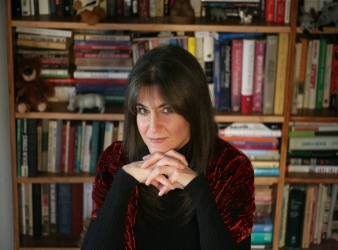Politics and International Relations is pleased to introduce a new academic staff member, Dr. Maria Armoudian. Dr. Armoudian joins the University from the United States, having previously studied and taught at the University of Southern California in Los Angeles, where she was a research fellow for two years (including one year as the Center for International Studies Fellow). She has also taught at California State University in Los Angeles.
At the University of Auckland, Dr. Armoudian’s taught courses “seek to understand the intersection of media and politics.” She explains her desire to work with students to “explore questions related to how media influence political outcomes: from war, genocide, human rights violations and peace-making, to elections and governance. Through these explorations we dissect the process of making news and other media content and look at how others – political leaders, advocates and audiences – interact with that media content, and the journalists and content providers who create it.”
Dr. Armoudian’s research is closely related to her teaching, and she has already published some of her findings in her first book, Kill the Messenger: The Media’s Role in the Fate of the World. The book presents 11 case studies that deal with war, genocide, peace-making, human rights protection, democratization and climate change. She says working on the book was a career highlight, as was the research conducted for her PhD dissertation, The Politics of Transformation: Mass Media and the Northern Ireland Peace Process. While working on her own research, she has also created new research connections: “I’ve really enjoyed building The Scholars’ Circle syndicated radio program, which brings together scholars of multiple disciplines each week to discuss the issues of our times.”
Dr Armoudian’s specialist interests have developed over many years of working in both government and in mass media. “I served as a commissioner in the City of Los Angeles for five plus years, worked for eight years in the California Legislature, and was both a broadcast and print journalist for many more years combined. Through these experiences and others, I was exposed to some of the ways that mass media has influenced politics and vice versa. As a child, I had also learned about human rights atrocities from my own family’s experience with the Armenian Genocide, which led me to puzzle about why people commit such atrocities. In exploring some of these questions, I found that mass media can be used for either great goodness or great evil such as genocides and wars. But the same media could also serve humanity: when we truly understand each other, societies and the phenomena that impact us all, we can make good decisions. And media can help us with this.”
Dr. Armoudian is looking forward to learning more about New Zealand society, having visited New Zealand only twice before taking up her role at the University. She says her initial impressions have been very positive. “I find New Zealand to be a beautiful country with a rich diversity and friendly spirit.”
She is also eager to making her own contribution. “I’m looking forward to building collaborative projects together with others at the university and the community – projects that will both help us better understand the socio-political world and to better our societies in the process – through intellectual discourse, both public and private, as well as through lighter engagements, including fun and laughter.”
Dr. Armoudian is currently working on a new book about war correspondents, under contract to Routledge. The book’s working title is Reporting from the Danger Zone: Frontline Journalists, their Jobs and an Increasingly Perilous Future.








